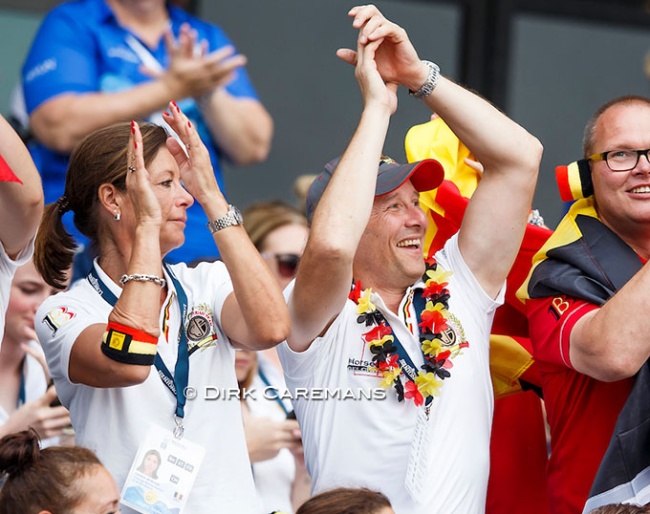
-- Jumping Mechelen press release, text by Kris van Loo, edited by Eurodressage
Photos © Dirk Caremans - Astrid Appels
The European Championships in Riesenbeck were a pleasant surprise, the Olympic Games in Paris a convincing confirmation. At the European Championships in 2023 and the Olympic Games in 2024, Belgian dressage set a new milestone. The underdog has become a full-fledged player in the dressage landscape.
Two of the architects are Carmen De Bondt and Jeroen Devroe, trainers of three of the four team members (Domien Michiels, Flore de Winne, and reserve Charlotte Defalque). How do they explain the success? It is not one key element, it is a series of many links. The mindset of the riders, the openness of the trainers, the facilities of the federation. These are just a few ingredients.
Did you have heated discussions and pillow fights in the bedroom in the run-up to the Olympics about your students being competitors?
Carmen: Not at all, because we always have an honest and objective assessment of our students.
Jeroen: We strengthen each other as trainers. Carmen makes constructive comments about my students and vice versa. We appreciate that from each other, fortunately. That is the only way to improve.
Don't coaches advocate for their students when it comes to selections?

Moorsele
Jeroen: In Paris Carmen coached Domien and Flore. I was there with Charlotte and we can tell each other what we see, which is very important. As a trainer you sometimes don't see everything after a while. After a while there is a risk that you become blind in your own business. Then it is important that someone points out certain points of interest.
Every rider and/or trainer wants to promote himself, right?
Carmen: The advantage of dressage is that the percentages are an objective parameter. If someone rides 71% all the time and someone else rides 69% all the time, isn't it clear?
At the beginning of this year it was pretty much clear that Larissa Pauluis and Flore De Winne were going to Paris. For third and reserve place it was between Domien Michiels and Charlotte Defalque. And they were evenly matched?
Carmen: Yes, and that has been clearly demonstrated. Domien's results were more consistent in the period just before the Games. As a result, he became the logical third man.
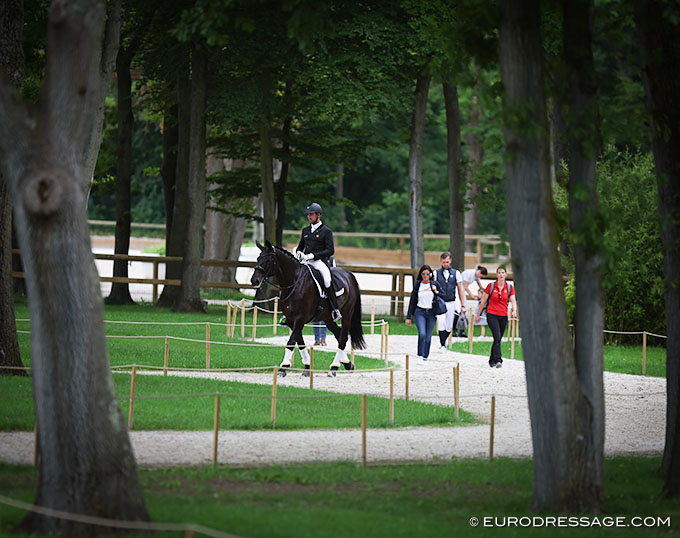
To what extent does the excitement and experience of the Olympic Games differ from a European or World Championship?
Jeroen: The big difference is that there are many more restrictions at the Olympic Games.
Carmen: For me it was the first time and there is not much difference with other championships. The EC last year, where we had to enforce our Olympic ticket, was as exciting.
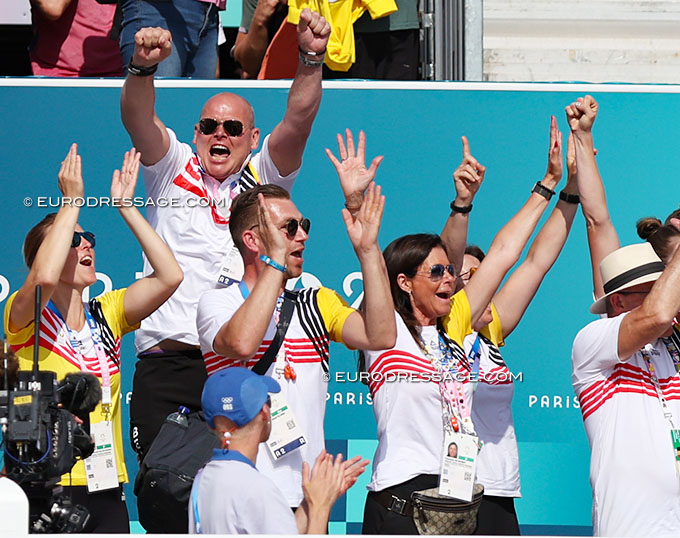
Carmen: That only sinks in afterwards. It is also a fact that we did not experience the Games intensely. We stayed in a hotel near Versailles, far away from the Olympic village. We only had contact with the cyclists.
Jeroen: the outfit unites. You are recognizable and are addressed by complete strangers, as if you are a representative of your country. Your sport is followed by everyone once every four years. A fifth place at the Games means more than a medal at a European Championship. The latter is only known to the inner circle, a fifth place is known to the whole of Belgium.
Carmen: It's not us but the outside world that reacts differently, in a more positive and enthusiastic way. After the Games, I was approached by people who had bought a package of tickets. They didn't know what they were getting and there were tickets for dressage. It was their first introduction and they were very enthusiastic about it. That's what the Olympic Games do to people.
Does that trickle down into the riders' minds?
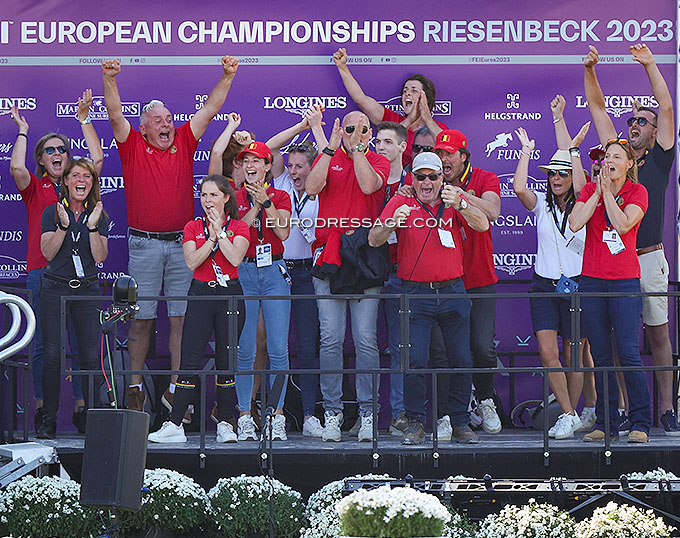
Where does this change come from? For decades our dressage riders scored 2% below their average at championships. Since Riesenbeck and now Paris they have achieved their best result?
Carmen: We have 4 riders who ride their test in a controlled and focused manner and who are not distracted by stress or environmental factors. This allows them to show what they are worth at championships. In other words, Belgium has a stress-free team or at least a team where stress has no influence on their test.
In addition, thanks to the facilities of Paardensport Vlaanderen, we have benefit greatly from the team training in Ternat. Stable Vanderhasselt is a blessing for our sport. We regularly brought the team together and everyone showed who they are. Constructive criticism was tolerated among each other, by riders and trainers. In this way, the team strengthened the individual. We also regularly invited international judge Maarten van der Heijden to train the test riding.
Why wasn't this thought of earlier?
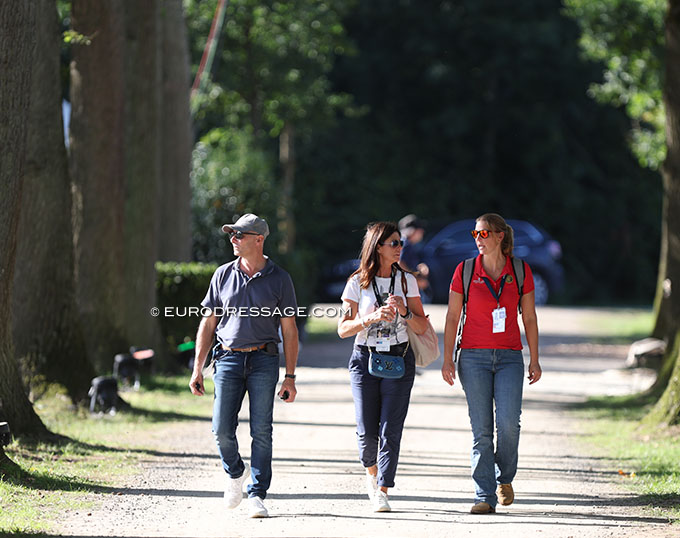
Jeroen: the quality of the horses is also better. The new approach to collective training brings out the quality.
Carmen: What you also notice is that the Belgian dressage combinations are receiving more and more appreciation and respect from the judges.
Is Belgium's 'natural' approach also gaining more appreciation?
Carmen: You hear that from foreign judges. Nice riding, that's what they say. The image that our riders have been showing for years looks self-evident and natural and that vision is increasingly being pushed forward.
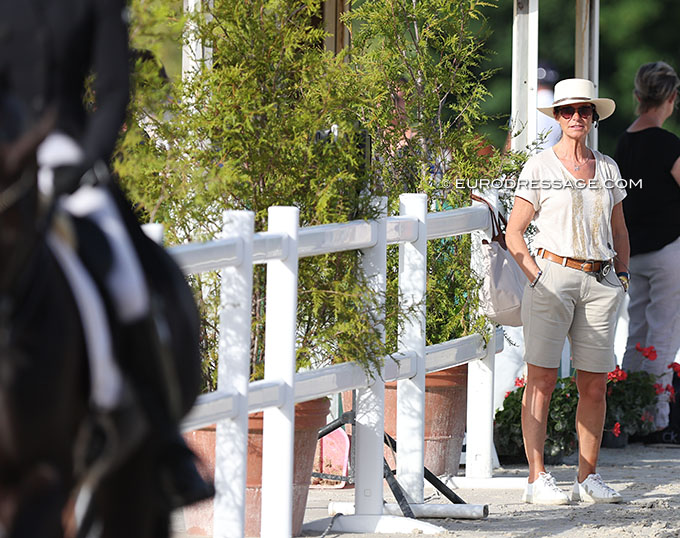
debut in Jardy in 2022
In that respect, look at Domien and Intermezzo. They rode their first Grand Prix together. How did that go in the past? Domien was already happy with the small tour. I pushed him to ride Grand Prix. Which he did little by little. Although that did not seem a must. Look where he is now! Also an evolutionary process.
Because there was too little faith in one's own abilities?
Carmen: If Domien had Intermezzo now, he would have ridden Grand Prix three years earlier.
Jeroen: When I used to ride nationally, three or four riders would start in the Grand Prix. Today, there are thirteen or fourteen, because our dressage riders stayed in the small tour for too long.
Fear of cold feet?
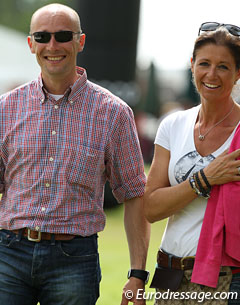
Carmen: That is indeed a big difference from the past. Today, no one is afraid to ask questions. In the past, students were shielded by their trainers. Now we are open and transparent. Do you know what my starting point is? Don't make someone else bad, make yourself better.
What stands out on the timeline: there was a period with national coaches. A few have passed by. Without success?
Carmen: (dryly) that is a fair statement.
Jeroen: and yet some still have the idea that a foreign coach is better by definition. What I do believe in is that we can strengthen our collective training with a sporadic foreign top trainer who sees even more and can correct small details, which is what happens between Carmen and I and by extension with all trainers of the Belgian riders, because you simply learn from everyone and top trainers often provide new insights.
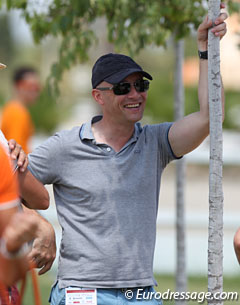
And now the future. Jeroen, are you going to Los Angeles in 2028 as a rider or as a trainer?
Jeroen: as a rider!? And maybe also as a trainer. As a rider with Lestor, who is now 8, or with Jackpot, 10 years. We have 4 more years.
You have already participated in all championships, except the Olympic Games. Is that an ambition?
Jeroen:….
Carmen: Just say yes!?
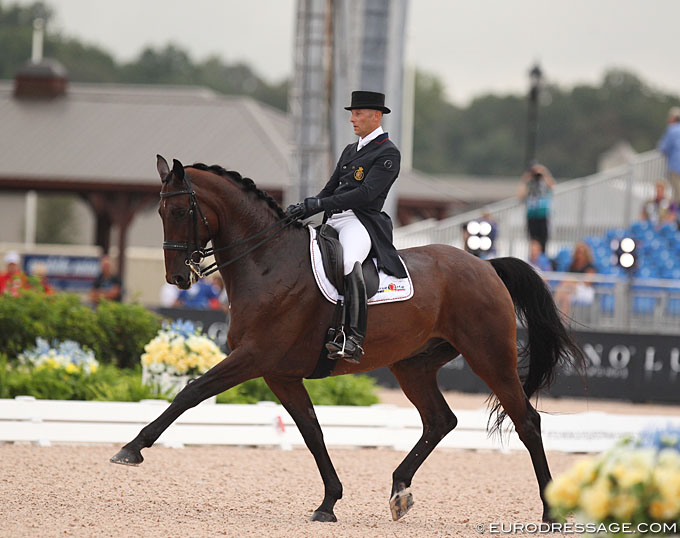
Carmen: I think we have the potential to achieve a good result in Los Angeles. I see a lot of good young horses and we have the structure and mindset. The foundation has been laid to make a fist in the future. The EC in Riesenbeck and the OG in Paris were no coincidence. We have a new standard that is now also recognized abroad.
Related Links
Jeroen Devroe Wins 2016 Belgian Grand Prix Championships
Jeroen Devroe Returns to the Grand Prix Ring with Eres DL
Jeroen Devroe's Paganini Passed Away
Three Belgian Combinations Short Listed for 2012 Olympic Dressage Nomination